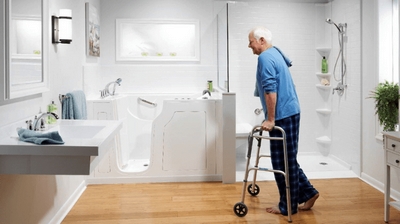

He said his administration is making it easier for Americans to save for retirement and said under his administration he'll protect the long-standing program.
Read More

Unlike younger patients... older adults can sustain pelvic fractures from something as simple as losing their balance and landing on their side.
In a groundbreaking stride toward enhancing the health and wellbeing of older adults, a pioneering study is set to explore the potent influence of light exposure on aging populations.
Financial experts said many of these forms of assistance are available to a broader range of retirees than most people realize. Here are ways to get “free money.”
Gifts made from what you already have carry your presence. They show thought, not transaction. And they often become the things people hold onto longest because they tell a story rather than fill a space.


Many folks think deep connections only happen when you're young. That's not true. At 60 and beyond, you can still find joy in romance and companionship. Life experience makes these bonds richer. Looking for love after 60 is not just possible. It's common now. More seniors date than ever, thanks to longer lives and better health. This guide shows you how to start. You'll learn to shift your mindset, explore meeting spots, stay safe, and handle bumps along the way. The perks? You bring wisdom and know what you want. No games. Just real matches.

Read more

Read more

Read more

Read more

Read more

- The human liver is the largest internal organ in the body, weighing about 3 pounds (1.4 kg) in adults.-The liver has a remarkable ability to regenerate itself. It can grow back to its full size even after surgical removal or injury, as long as some healthy tissue remains.- The liver performs over 500 vital functions, including detoxifying harmful substances, producing bile to aid digestion, storing vitamins and minerals, and regulating blood clotting.- The liver receives blood from two sources: the hepatic artery (oxygen-rich blood) and the portal vein (nutrient-rich blood from the intestines).- It acts as a filter for blood, removing toxins, bacteria, and worn-out red blood cells, helping keep the bloodstream clean and healthy.


How Working Part Time
in Retirement
Can Quietly Change
Your Social Security Benefits

By Jordan Rosenfeld
Many retirees assume part-time work is harmless from a tax standpoint when they begin collecting Social Security, but it’s more complicated than that.
The disappearance of Nancy Guthrie highlights the tension between an older adult's desire to “age in place” and an adult child’s concern for their safety.
Read more
****
Social Security:
How To Protect Your Budget
Now Ahead of a Potentially
Tiny 2027 COLA Increase

By Josephine Nesbit
Early estimates suggest 2027 may bring.....small adjustment(s). If the Senior Citizens League predictions hold, the 2027 COLA could again be 2.8%. And some predictions are even smaller.
Bathrooms can pose serious risks for a senior or anyone who is aging. Floors are tiled, surfaces are wet, the space is tight, and everything is made of hard materials.
These recipes are designed to be easy, comforting, and incredibly reheat-friendly, because the best snow-day meals should last more than one serving.


Blizzards are bad. The one that hit here in the Northeast on Monday was no exception.Almost 16-20 inches of snow fell on the tri-state area. NYC bore the brunt of it.But sometimes it does not have to fall into the category of a blizzard. A blizzard is defined as "a storm which contains large amounts of snow or blowing snow, with winds in excess of 35 mph and visibility of less than 1/4 mile for an extended period of time (at least 3 hours)." It can still be a memorable snow event.Continue Reading >>


Read more

Read more

Read more

Read more

Read more

- Jam: Made from crushed or chopped fruits cooked with sugar. It has a thick, chunky consistency with pieces of fruit throughout. It's more textured and contains both juice and pulp from the fruit.- Jelly: Made from fruit juice extracted from the fruit, cooked with sugar and a gelling agent like pectin. It has a smooth, firm, and clear consistency without any fruit pieces.In summary, jam contains pieces of fruit and a chunkier texture, while jelly is smooth and made from fruit juice.



The many predicting doom ignore that Social Security is all about general revenues, not what’s in a “lockbox” that has never existed.
The researchers demonstrated that their models predicted the onset of Alzheimer’s symptoms within a margin of three to four years.
Read more

While it’s true that waiting longer increases your benefit, your total lifetime payout could be lower if you don’t live as long as expected.
Instead of trying to see friends more often than you can reasonably manage, choose a rhythm you can maintain. A standing monthly lunch, a weekly phone call, or a short check-in message.
It is not just about walking slower or learning to lift a frame. It is about learning to live differently in a world that often overlooks the quiet challenges of aging.


One of the questions people considering a move to an assisted living facility (A.L.F.) ask is, “Will there be enough activities to keep me busy?” The simple answer to that is, “Yes.” However, the real question should be, “Are the activities something I’ll be interested in?” For me, and for many of my fellow residents here at the Asylum, the answer is a resounding “No.”Continue reading >>

Read more

Read more

Read more

Read more

Read more

The invention of the automobile cannot be attributed to a single individual, as it was the result of numerous innovations and contributions by various inventors over time. However, Karl Benz is widely credited with creating the first true automobile in 1885-1886, when he developed the Benz Patent-Motorwagen, which was powered by an internal combustion engine. His design set the foundation for modern cars and earned him the recognition as the inventor of the automobile, although earlier devices and prototypes by inventors like Nicolas-Joseph Cugnot and others played crucial roles in the evolution of motorized transportation.




Read more

For a financially secure 78-year-old retiree, a monthly budget supports a settled home, dependable healthcare, quality food and the freedom to enjoy daily life without financial pressure. The focus is on ease and predictability, with room for travel, hobbies, and helping family when needed.
Read more

Do you need to get your financial life on track? Our annual survey reveals the most reliable and trusted apps and services for tracking finances, trading stocks, making digital payments, and checking your credit score.
Read more

A seven-figure retirement portfolio may seem like an unshakeable safety net, but in practice, it can be fragile. Here are three critical mistakes that millionaire retirees make that can jeopardize their financial security.
A fixed income can feel steady until an unexpected expense appears. A medical bill. A home repair. Rising insurance costs. Or simply the reality that prices keep increasing while income stays the same.

By Aileen IngramThe Modified Adjusted Gross Income (MAGI) shapes eligibility for many under 65. It's your tax income minus a few deductions, like student loan interest. However, there are other factors that determine eligibility.

Read more

Read more

Read more

Read more

Read more

- Measles is caused by the measles virus and is one of the most contagious infectious diseases, spreading through respiratory droplets when an infected person coughs or sneezes.- The initial symptoms include high fever, cough, runny nose, and red eyes, followed by a characteristic rash that typically starts on the face and spreads across the body.- Measles can be effectively prevented through the MMR (measles, mumps, rubella) vaccine, which is safe and highly effective.- If not vaccinated, measles can lead to serious complications such as pneumonia, encephalitis (brain swelling), and even death, especially in young children and immunocompromised individuals.- Despite the availability of a vaccine, measles outbreaks still occur worldwide, often in areas with low vaccination coverage, highlighting the importance of global immunization efforts.↓

















